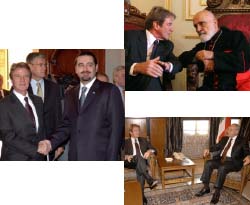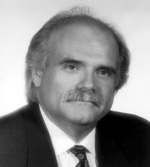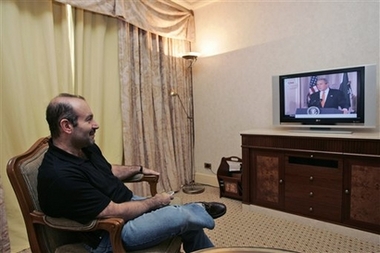 Daily star, BEIRUT: French Foreign Minister Bernard Kouchner described the results of his talks with Lebanese political leaders as "excellent" Tuesday, but he also warned that the situation remains complicated. "France wants and hopes this [election] process to be held according to the Lebanese Constitution," Kouchner said before his scheduled departure from Lebanon late Tuesday night. He also warned that if a new president were not selected before the expiration of incumbent Emile Lahoud's term on November 24, "no one knows what will happen."
Daily star, BEIRUT: French Foreign Minister Bernard Kouchner described the results of his talks with Lebanese political leaders as "excellent" Tuesday, but he also warned that the situation remains complicated. "France wants and hopes this [election] process to be held according to the Lebanese Constitution," Kouchner said before his scheduled departure from Lebanon late Tuesday night. He also warned that if a new president were not selected before the expiration of incumbent Emile Lahoud's term on November 24, "no one knows what will happen."
Kouchner met twice with Maronite Patriarch Nasrallah Butros Sfeir, and two more times with parliamentary majority leader MP Saad Hariri. He announced from Ain al-Tineh, where he met Speaker Nabih Berri, that he would be returning to Lebanon next week before November 21, the latest date set by Berri for a session of Parliament to elect a new president. During a press conference at Beirut's Rafik Hariri International Airport later, he also said he was "optimistic" about contacts between the government and the opposition - and that he expected Berri would convene the November 21 session.
 UNITED NATIONS - The UN chief has appointed a former Canadian prosecutor to head a commission investigating the 2005 assassination of former Lebanese prime minister Rafik Hariri, according to a letter to the Security Council released Tuesday.
UNITED NATIONS - The UN chief has appointed a former Canadian prosecutor to head a commission investigating the 2005 assassination of former Lebanese prime minister Rafik Hariri, according to a letter to the Security Council released Tuesday.
Daniel Bellemare replaced Belgian lawyer Serge Brammertz, who was nominated to head the Yugoslav war crimes tribunal in the Hague. UN Secretary General Ban Ki-Moon made both announcements in two letters to the Security Council, which must approve the Brammertz appointment.
In a July report, Brammertz signalled that the UN International Independent Investigation Commission would wrap up its work and transfer findings to the international tribunal established by the Security Council on May 30 to prosecute suspects in Hariri's assassination.
Brammertz said the UN inquiry had identified people who may have been involved, though he did not name anyone. He said investigators had "significantly narrowed down" possible motives for the slaying to Hariri's political and personal relationships in Lebanon, Syria and other countries.
 WASHINGTON (Reuters) - A Lebanese woman who worked for the CIA and FBI pleaded guilty on Tuesday to using government computers to gain information about the hezbollah group and fraudulently obtaining U.S. citizenship, the Justice Department said.Nada Prouty, 37, pleaded guilty in Michigan to charges of conspiracy, unauthorized computer access and naturalization fraud. The charges carry penalties of up to 10 years in prison, fines and loss of citizenship.
WASHINGTON (Reuters) - A Lebanese woman who worked for the CIA and FBI pleaded guilty on Tuesday to using government computers to gain information about the hezbollah group and fraudulently obtaining U.S. citizenship, the Justice Department said.Nada Prouty, 37, pleaded guilty in Michigan to charges of conspiracy, unauthorized computer access and naturalization fraud. The charges carry penalties of up to 10 years in prison, fines and loss of citizenship.
"This defendant engaged in a pattern of deceit to secure U.S. citizenship, to gain employment in the intelligence community, and to obtain and exploit her access to sensitive counterterrorism intelligence. It is fitting that she now stands to lose both her citizenship and her liberty," Assistant Attorney General Kenneth Wainstein said.Court documents in the case charge that Prouty arrived in the United States in 1989 and entered a sham marriage the following year in order to remain in the country. She became a U.S. citizen in 1994.
Prouty got a job in 1999 as a FBI special agent with a security clearance, and worked in Washington investigating crimes against Americans overseas.She used an FBI computer to gain information about an FBI probe of the Hezbollah, the court documents said, although her work responsibilities did not involve the group, which the United States has labeled a terrorist organization.
 BEIRUT, Lebanon - The curtains are drawn shut. Security guards are on constant watch, pacing the hallways and searching visitors. Bomb detectors, police armored vehicles and checkpoints monitor traffic outside. The Phoenicia Hotel, a famous Beirut tourist draw, has become a fortress. The Phoenicia was the premier hotel in Beirut during the city's heyday in the 1960s and 1970s, but was then destroyed by fierce fighting in the 1975-1990 civil war. Its rebuilding and reopening in the 1990s made it a symbol of the capital's revival.
BEIRUT, Lebanon - The curtains are drawn shut. Security guards are on constant watch, pacing the hallways and searching visitors. Bomb detectors, police armored vehicles and checkpoints monitor traffic outside. The Phoenicia Hotel, a famous Beirut tourist draw, has become a fortress. The Phoenicia was the premier hotel in Beirut during the city's heyday in the 1960s and 1970s, but was then destroyed by fierce fighting in the 1975-1990 civil war. Its rebuilding and reopening in the 1990s made it a symbol of the capital's revival.
The hotel is housing about 40 Lebanese lawmakers from the ruling coalition who say they fear death at the hands of their foe Syriaas the deeply divided parliament tries again to pick a president on Monday.It's like voluntary house arrest," lawmaker Mustafa Alloush said, sitting on a couch in a 14th-floor suite of an annex of the hotel as two security guards listened in.
"By staying here, we are hopefully making it more difficult, though not impossible, for them to kill us," he told The Associated Press on Tuesday.Since legislator Antoine Ghanem was killed in a Sept. 19 car bombing, Alloush and his colleagues have been living under strict security in the five-star annex neighboring the hotel on Beirut's seaside, hoping to avoid a similar fate.Failure to pick a replacement for President Emile Lahoud whose term expires Nov. 24, could result in two rival administrations
Back in the safety of the Phoenicia's annex, lawmakers pass the time reading newspapers, surfing the Internet, receiving visitors and watching movies. "Some of the guys also like to play cards. Others enjoy discussing politics or talking about literature and art," Alloush said. The legislator from lush green northern Lebanon tells of his longing to see the sun, saying he's been out of the hotel twice in nearly two months since he moved in. An AP photographer was told by security escorts at the hotel he could do "anything except open the curtains," apparently for fear of snipers. Video footage was not permitted. "This is a precedent, to have politicians from the ruling majority being targeted like this," Alloush said. "
Khazen History


Historical Feature:
Churches and Monasteries of the Khazen family

St. Anthony of Padua Church in Ballouneh
Mar Abda Church in Bakaatit Kanaan
Saint Michael Church in Bkaatouta
Saint Therese Church in Qolayaat
Saint Simeon Stylites (مار سمعان العامودي) Church In Ajaltoun
Virgin Mary Church (سيدة المعونات) in Sheilé
Assumption of Mary Church in Ballouneh
1 - The sword of the Maronite Prince
2 - LES KHAZEN CONSULS DE FRANCE
3 - LES MARONITES & LES KHAZEN
4 - LES MAAN & LES KHAZEN
5 - ORIGINE DE LA FAMILLE
Population Movements to Keserwan - The Khazens and The Maans
ما جاء عن الثورة في المقاطعة الكسروانية
ثورة أهالي كسروان على المشايخ الخوازنة وأسبابها
Origins of the "Prince of Maronite" Title
Growing diversity: the Khazin sheiks and the clergy in the first decades of the 18th century
Historical Members:
Barbar Beik El Khazen [English]
Patriach Toubia Kaiss El Khazen(Biography & Life Part1 Part2) (Arabic)
Patriach Youssef Dargham El Khazen (Cont'd)
Cheikh Bishara Jafal El Khazen
Patriarch Youssef Raji El Khazen
The Martyrs Cheikh Philippe & Cheikh Farid El Khazen
Cheikh Nawfal El Khazen (Consul De France)
Cheikh Hossun El Khazen (Consul De France)
Cheikh Abou-Nawfal El Khazen (Consul De France)
Cheikh Francis Abee Nader & his son Yousef
Cheikh Abou-Kanso El Khazen (Consul De France)
Cheikh Abou Nader El Khazen
Cheikh Chafic El Khazen
Cheikh Keserwan El Khazen
Cheikh Serhal El Khazen [English]
Cheikh Rafiq El Khazen [English]
Cheikh Hanna El Khazen
Cheikha Arzi El Khazen
Marie El Khazen